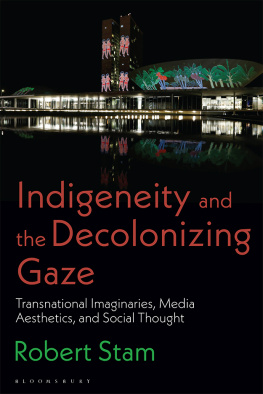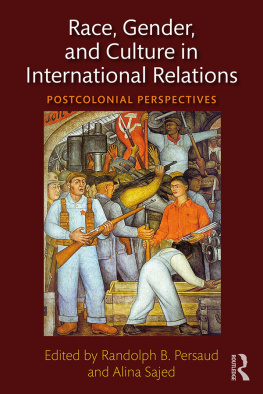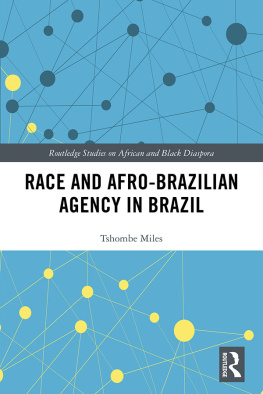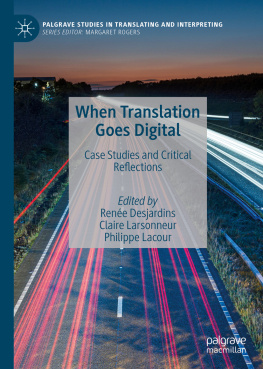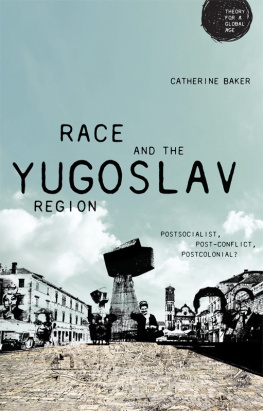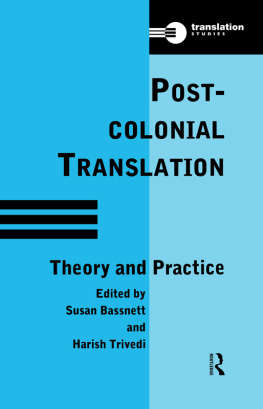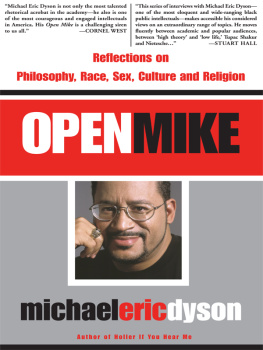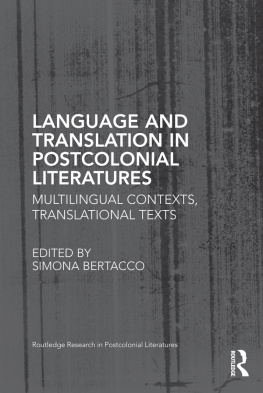Thank you for buying this ebook, published by NYU Press.
Sign up for our e-newsletters to receive information about forthcoming books, special discounts, and more!
Sign Up!
About NYU Press
A publisher of original scholarship since its founding in 1916, New York University Press Produces more than 100 new books each year, with a backlist of 3,000 titles in print. Working across the humanities and social sciences, NYU Press has award-winning lists in sociology, law, cultural and American studies, religion, American history, anthropology, politics, criminology, media and communication, literary studies, and psychology.
Race in Translation
Race in Translation
Culture Wars around the Postcolonial Atlantic
Robert Stam | Ella Shohat

NEW YORK UNIVERSITY PRESS
New York and London
www.nyupress.org
2012 by Robert Stam/Ella Shohat
All rights reserved
References to Internet Websites (URLs) were accurate at the time of writing. Neither the author nor New York University Press is responsible for URLs that may have expired or changed since the manuscript was prepared.
Library of Congress Cataloging-in-Publication Data
Stam, Robert, 1941
Race in translation : culture wars around the postcolonial Atlantic / Robert Stam and
Ella Shohat.
p. cm.
Includes bibliographical references and index.
ISBN 978-0-8147-9837-9 (cl : alk. paper)
ISBN 978-0-8147-9838-6 (pb : alk. paper)
ISBN 978-0-8147-2392-0 (ebook)
ISBN 978-0-8147-2525-2 (ebook)
1. Race. 2. Culture. 3. Postcolonialism Atlantic Ocean Region.
4. Multiculturalism Atlantic Ocean Region.
5. Ethnicity Atlantic Ocean Region. I. Shohat, Ella, 1959- II. Title.
CB195.S73 2012
305.8009163dc23 2011050487
New York University Press books are printed on acid-free paper, and their binding materials are chosen for strength and durability. We strive to use environmentally responsible suppliers and materials to the greatest extent possible in publishing our books.
Manufactured in the United States of America
c 10 9 8 7 6 5 4 3 2 1
p 10 9 8 7 6 5 4 3 2 1
To Jacob
Contents
Acknowledgments
IN THE LONG process of gestation of this bookgoing back to its first conceptualization realized in an essay (Travelling Multiculturalism: French Intellectuals and the U.S. Culture Wars) published in Black Renaissance Noire in 2001we have received the support of many friends, colleagues, and institutions. We would like to thank the following for offering insightful commentary on earlier drafts or sections or on oral presentations of the project: Christopher Dunn, Patrick Erouart, Ismail Xavier, Jim Cohen, Manthia Diawara, Ziad Elmarsafy, Srgio Costa, James Stam, Anne Donadey, Marcelo Fiorini, Randal Johnson, George Ydice, Diana Taylor, Neil Smith, Michael Hanchard, Yal Bitton, Randy Martin, Robert Young, and Rajeswari Sunder. Various readers for NYU Pressnotably Arturo Escobar, Minoo Moallem, and Dilip Gaonkarmade useful suggestions. We are also grateful for the indispensible assistance we have received at various stages from Benjamin Minh Ha, Cecilia Sayad, Paulina Suarez-Hesketh, Karen Wang, Sandra Ruiz, Leili Kashani, Karim Tartoussieh, and Leo Goldsmith, and especially from Jennifer Kelly, who has been wonderfully helpful during the diverse stages of the project, including up through the demanding work of indexing. We are also grateful to NYU Press editor in chief Eric Zinner for his support and patience and to managing editor Despina Papazoglou Gimbel and copyeditor Andrew Katz for their meticulous work.
The intellectual conversations promoted by various centers at NYU have been an endless source of stimulation and inspiration. Here we would like to cite La Maison Franaise, the Institute of French Studies, the Center for Latin American and Caribbean Studies, the Hemispheric Institute of Performance and Politics, the Juan Carlos of Spain Center, the Center for Media, Culture and History, and the Center for Art and Public Policy in Tisch School of the Arts, along with various seminars and discussion groups such as the Postcolonial Studies Seminar and the Comparative Race Studies Group. Our warm appreciation also goes to the following: Evelyn Alsultany, Awam Amkpa, Vincent Carelli, Ernesto Ignacio de Carvalho, Moncef Cheikrouhou, Luiz Antonio Coelho, Marc Cohen, Amalia Cordova, Karel Depollo, Ayse Franko, Eti and Selim Franko, Faye Ginsburg, Inderpal Grewal, Maurice Hazan, Caren Kaplan, Kate Lyra, Ivone Margulies, Anne McClintock, Rob Nixon, Yigal Nizri, Marcelle Pithon, Mary Louise Pratt, Yvette Raby, Jolene Ricard, Ilda Santos, Eyal Sivan, Shouleh Vatanabadi, Joo Luiz Vieira, and Anne Wax.
We would like to thank the following colleagues and institutions for facilitating the presentation of our work (alone or together): Inderpal Grewal and the Culture and Theory Lecture Series at the University of California, Irvine; Caroline Cappucin and LInstitut dAmrique Latine in Paris; Yasuko Takezawa and the Institute for Research in Humanities at Kyoto University, Japan; Patrick Wolfe and the University of Melbourne, Australia; Deane Williams and Monash University, Australia; Manuela Ribeiro Sanchez and the Europe in Black & White conference at the Centro de Estudos Comparatistas at the University of Lisbon, Portugal; Arnold H. Itwaru and the University of Toronto; Armida de la Garza and Nottingham University in Ningpo, China; Manuela Boatc and the Critical Thought/Transformative Practice Seminar at the Instituto Universitrio de Pesquisas in Rio de Janeiro, Brazil; Diana Accaria and the Seminar on Postcolonial Theory and the Departments of English, History, and Comparative Literature at the University of Puerto Rico at Ro Piedras; Suvir Kaul and Ania Loomba and the Postcolonial Studies and Beyond conference, the University of Illinois at Urbana-Champaign; Vermonja Alston and York University, Toronto; the Borchers Lecture Series, University of Wisconsin, Madison; Timothy Powell, Eve Troute Powell, and the Multicultural Studies conference at the University of Georgia; Frederic Viguier and Francine Goldenhar at the Maison Franaise at New York University; Diana Taylor and NYUs Hemispheric Institute of Performance and Politics and its encuentros in Monterrey, Mexico, and Lima, Peru; Edward Said, Joseph Massad, and Gil Anidjar and the Comparative Cultures University Seminar, Columbia University; Dora Baras and the Subversive Film Festival in Zaghreb, Croatia; the Area Studies in the Era of Globalization seminar at the Social Science Research Council, New York; Lucia Nagib and the World Cinema program at Leeds University, England; Leslie Bethell and the Center for Brazilian Studies at Oxford University; Srgio Costa and the Conference on Brazil at the Free University in Berlin; Armida de la Garza and the Conference on Co-Productions in Puebla, Mexico; Z Gatti, SOCINE, and the Federal University of Santa Catarina, Brazil; Omar Gonzales and ICAIC, Havana, Cuba; Brazilian Association of Comparative Literature (ABRALIC), Federal University of Salvador Bahia; the Alliance Franaise in New York City; Casa do Saber, Rio de Janeiro, Brazil; Faye Ginsburg and the Center for Media, Culture and History, NYU; and Tim Mitchell and ICAS, NYU.
We have also benefited from the opportunities to conduct seminars related to the issues of the book at the University of So Paulo, Brazil (Shohat, Spring 2010); the Federal University of Rio de Janeiro (Stam, Spring 2010); the Federal University of Cuiaba, Brazil (Stam, Spring 2010); the Institute of Postcolonial Transcultural Studies and at the University of Bremen, Germany, the Inaugural Lectures/Seminar Series hosted by Sabine Broeck (Shohat and Stam, JuneJuly 2009); the NYU in Paris Program and Caroline Montel and Katherine Fleming at the NYU Center for European Studies, as well as Universit Sorbonne Nouvelle, Paris III, hosted by Jacques Aumont and Philippe Dubois (Shohat and Stam, Fall 2008); the School of Criticism & Theory, and Dominick LaCapra, Cornell University, 30th Summer Session (Shohat and Stam 2006), and the Seminar in Experimental Critical Theory: Present Tense Empires, Race, Bio-Politics, and David Goldberg and Lisa Lowe, at the UC Humanities Research Institute, University of California, Irvine (Shohat 2005).
Next page

